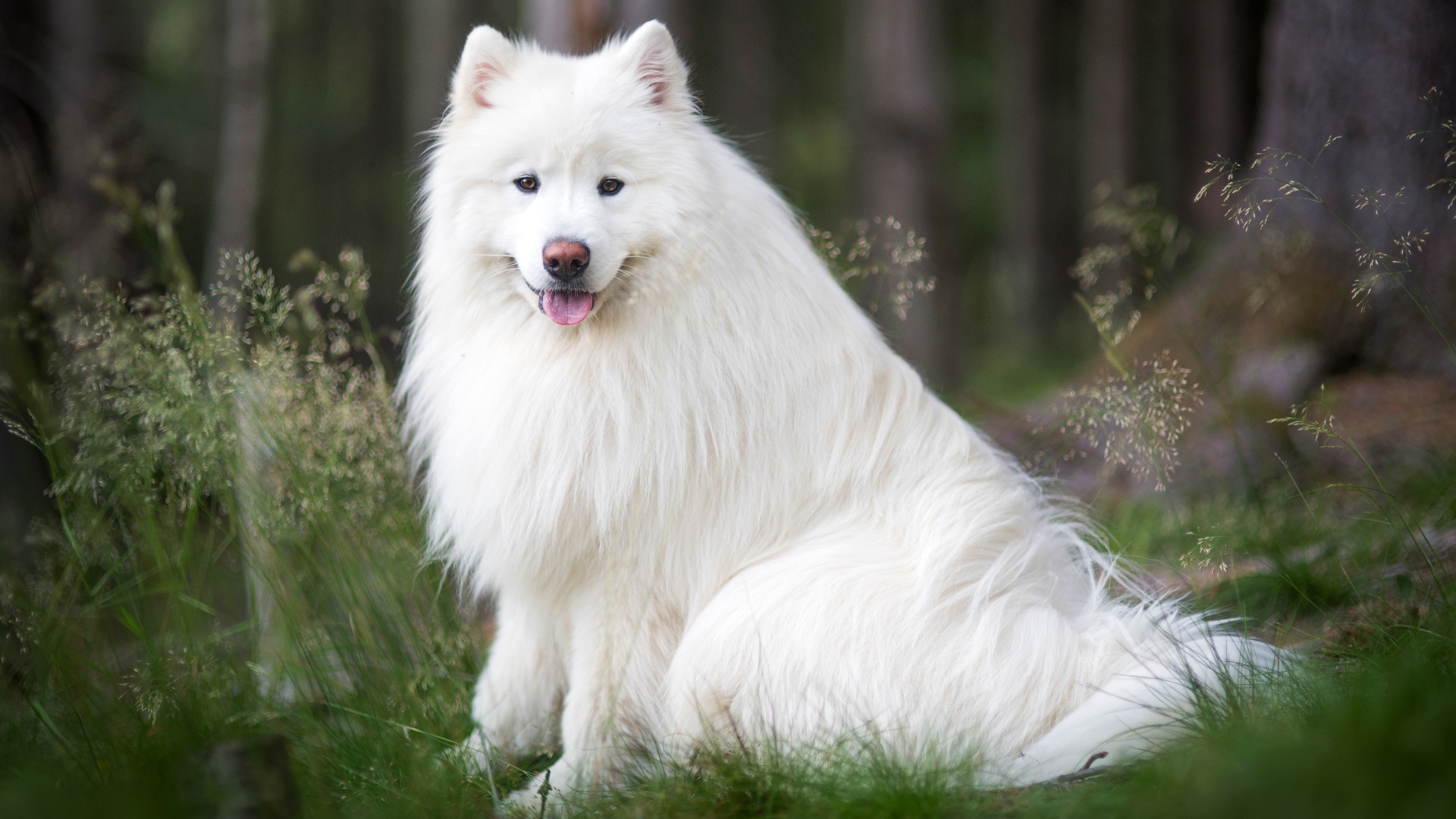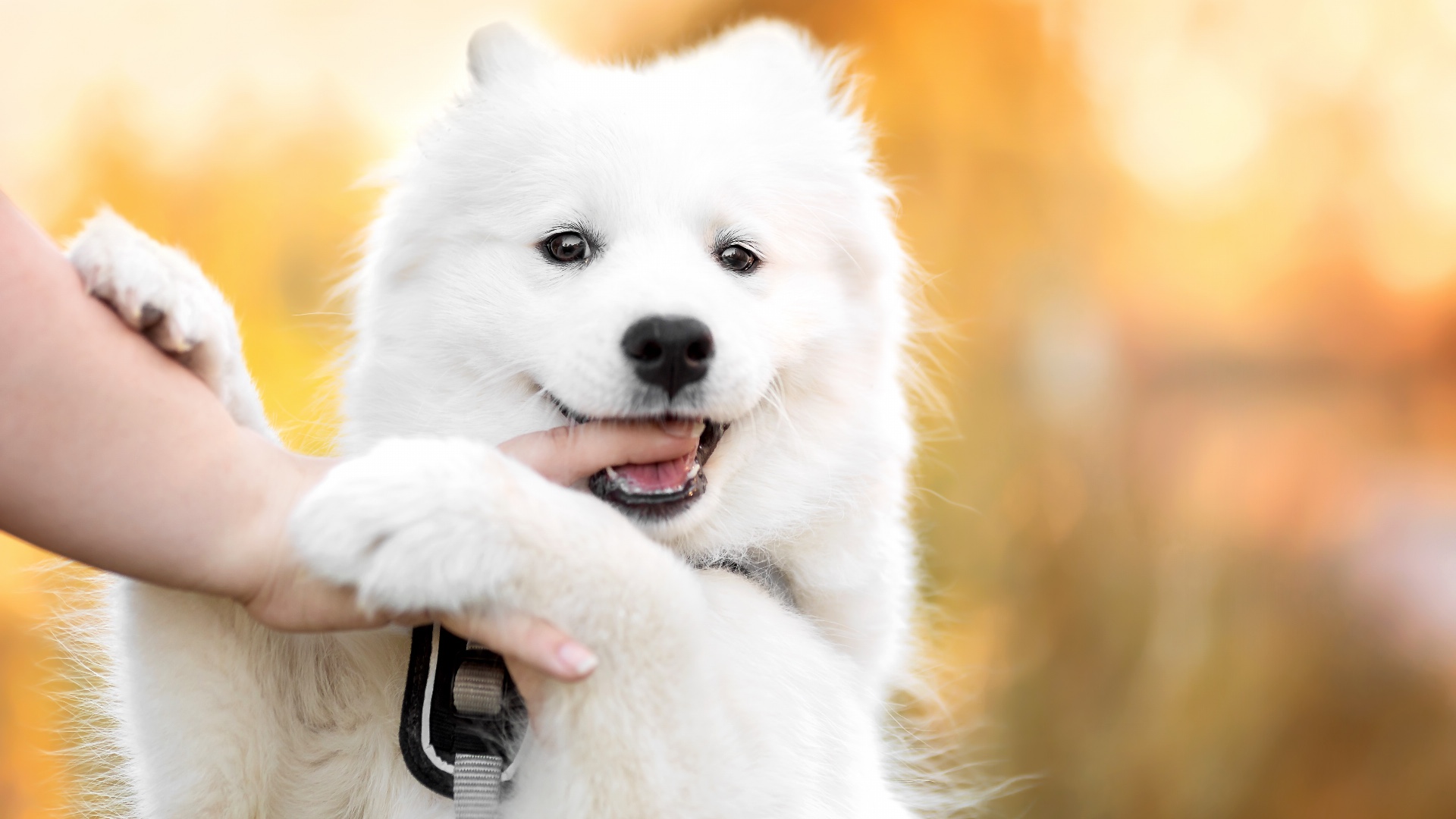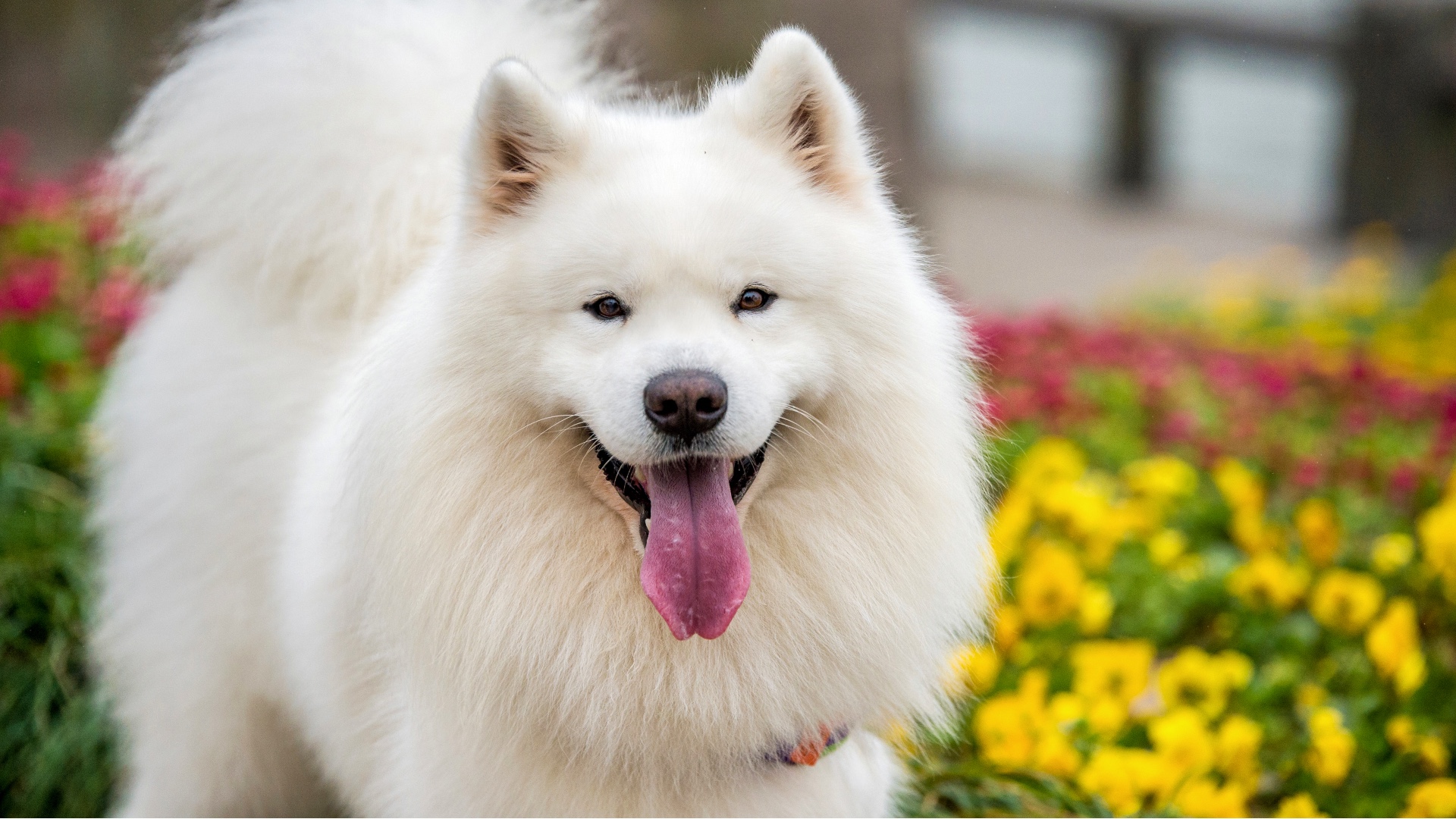Samoyed: Breed profile
Energetic and sweet-natured, the lively Samoyed makes the ideal playful and loving companion for the active adventurer

You can't help but smile when you encounter a Samoyed. As well as being lively and loving, they have a big beaming grin across their face. They're also one of the gentlest dogs you'll encounter.
But then Sammies, as they're also known, have a history of getting on swimmingly well with humans. They have worked alongside us for centuries, prized for their herding and protective abilities.
Hailing from Siberia, they got their name from the Samoyed people who used them to hunt and pull sleds. Samoyed dogs were also put to work by 19th-century explorers to the North and South Poles and they became a firm favorite of royalty – notably Alexandra of Denmark – in the 20th century.
Today, however, they're just as popular but used less for tasks and more as fun family pets. For what you get with a Samoyed is an intelligent but so very cute canine; a breed that will look out for you and become a firm friend.
Sure, they'll keep you on your toes as we'll see and they'll also pose a challenge in terms of their training and the amount of grooming they require. But their curiosity and playfulness are sure to win your affection and you'll get it back in abundance.
How much exercise does a Samoyed need?
Life expectancy: 12 - 14 years
Average weight: Male: 65lbs/30kg Female: 45lbs/20kg
About the same as: A nine-year-old child
Want an easy life? It's not going to happen with a Samoyed to care for! This breed loves to be on the go and they'll chomp at the bit to be taken for a walk or engage in some fun games with you. Aim for about two hours each day and supplement that with regular jaunts around your yard if you have one (just make sure it's secure and you're watching over them). If you love to go on hikes, that's even better, because a Samoyed will definitely want to accompany you and, thanks to their high endurance, will probably be able to keep going long after you're flagging.
It's also important to exercise their mind so consider the best dog toys and try to come up with exciting games. Just be aware that Samoyeds have a strong urge to roam. You should keep them on a leash in public places to stop them from running away and be wary of encountering small animals on your walks. Their high prey drive and instinct to hunt will mean they'll dart off at a moment's notice. You may have trouble keeping up!
Get the best advice, tips and top tech for your beloved Pets
Are Samoyeds easy to train?
Suitable for: Energetic dog owners who want a loving, gentle companion
Not suitable for: Anyone who wants a quiet life and is away for much of the day
Temperament: Playful, lively, friendly
Shedding: High
Yes and no. A lot depends on how early you get stuck into training – the younger they are, the more receptive they are going to be. When approaching your sessions, you need to be aware that Sammies are intelligent, easily distracted, independent pack animals. To that end, you're going to have to establish yourself as a firm, consistent and fair leader willing to set ground rules and be demanding of respect. Using positive reinforcement with the best dog treats, and issuing commands in a happy manner will work wonders, however.
It's definitely a good idea to focus this breed's attention on a particular task during a training session. That way you can prevent boredom from setting in. You should also avoid anything repetitive because, again, their mind will soon wander. It's crucial that any training rules and boundaries you set are followed by all family members otherwise Sammies will figure there's a bit of leeway and seize on it. With perseverance, however (and maybe some assistance from a local training class), you'll eventually have a well-behaved, if not a little mischievous, dog on your hands.
Are Samoyeds good with kids?

Samoyeds are not only good with children, they're absolutely great! In fact, this super-friendly breed tends to have a very special bond with kids, becoming a wonderfully fun and loyal playmate. They display great patience and love the attention of young minds. They will also tap into their instinct to herd, often gently nudging kids to move them in the direction they want them to go.
The only thing to consider is this breed's size and energy. If you have very small children, then you should maintain an extra vigilant eye just in case the Samoyed accidentally bumps into them and potentially causes an injury. But there's no doubt that this breed loves to make friends and they'll more than match the liveliness of any child.
What do Samoyeds eat?
Since Samoyeds are large and energetic dogs, they will burn a lot of calories each day. At the same time, they are prone to packing on the pounds so it is important that you feed them a complete and balanced diet. They'll thrive equally well on the best wet dog food or the best dry dog food with moderate protein and fat percentages. You should feed them twice a day at regular times and if you're going to give them treats (and believe us, you will), try not to allow them to make up more than 10 percent of their overall diet.
Do Samoyeds bark a lot?
Samoyeds are more talkative than many other breeds and you will find some of them appear to bark non-stop. They'll make an excited noise if someone is visiting and they may also be prone to howling which isn't too kind on the ears.
You can, however, seek to train Samoyeds to be quieter and given how piercing the noise can be, there's every chance you'd want to do this. After all, Samoyeds were once named the naughtiest dog breed with an average of 52.8 barks each day – twice that of a Yorkshire Terrier in second place!
Are Samoyeds aggressive?

Take one look at a Samoyed's adorable face with their infamous “Sammy Smile” and you almost have your answer right there! Far from being a Joker-like grin hiding a nasty agenda, this smile is an entirely happy one, befitting a breed that is overwhelmingly social and friendly.
Samoyeds can become sad though – particularly if you don't pay them a lot of attention as they thrive in human company. They can become very attached to particular family members but they'll also express their love more widely, making them an adorable breed that's great to have around.
Sure, they'll bark but it's far, far worse than their bite. Indeed, it would take a lot of provocation or fear for them to sink their teeth into anyone. That's not to say they're always on their best behavior but their cheerful attitude makes them far from dangerous.
Do Samoyeds shed a lot?
Amount Of Shedding: High
Easy To Groom: No
General Health: Good
Potential For Weight Gain: Moderate
Oh my! Shall we break this to you gently? Yes, they do shed. A lot! And that's an understatement. Since they have a hugely thick white double coat, you'll discover that they shed excessively twice a year. The fur has been described as being on a par with a sheep's fleece and it's little wonder that the molted undercoat is used to make clothes – people have been knitting with yarn spun from their fur since the 1940s.
You can minimize the amount of hair being spread around your home with regular, almost-daily grooming. Invest in the best dog brushes and be sure to include their head and legs during grooming routines and you can get on top of things pretty quickly while ensuring the hair doesn't become matted. With a trim of the nails, regular baths and a few trips to a professional groomer, a Samoyed (and your home) can soon look great!
Wisdom Panel Breed Discovery DNA Kit | Amazon
Not sure exactly what breed your dog is? This kit screens for 365+ breeds – because knowing every detail about your dog helps you understand how best to care for them.
Samoyed health problems
Samoyeds are generally healthy dogs but they can suffer from hip dysplasia and eye problems such as ulcers, glaucoma and cataracts. Other common conditions are cancers and diabetes but watch out for Samoyed Hereditary Glomerulopathy which tends to affect males more and can cause kidney failure and hearing loss at an early age. It can be treated but not halted in its tracks or cured.
Should I get a Samoyed?
Yes. Although Sammies are said to be one of the most expensive dog breeds in the world, they are amazing to have around. If you're looking for a breed that will be great with kids, then you don't necessarily have to search much further. Similarly, if a gentle happy temperament is what you're after, Samoyeds have it nailed. But they are difficult to care for and they do bark a lot. They're not the breed to have if you prefer a quiet life curled up in front of the TV.
Want to learn more about this breed? Here are our favorite Samoyed facts

David Crookes has been a journalist for almost 30 years and he has written for a host of magazines, newspapers, websites and books including the World of Animals Annual, BBC Earth, Live Science, The Independent and Tom’s Guide.
Born in England, he lives with two cats but he’s also keenly interested in the differences between the huge number of dog breeds – in fact, you can read many of his breed guides that he’s written in collaboration with vets here on PetsRadar.
With a lifelong passion for technology, too, he’s always on the lookout for useful devices that will allow people to keep their pets happier and healthier, and provide them more time to spend together.
David has a degree from Durham University, as well as postgraduate diploma in journalism from the University of Central Lancashire.

